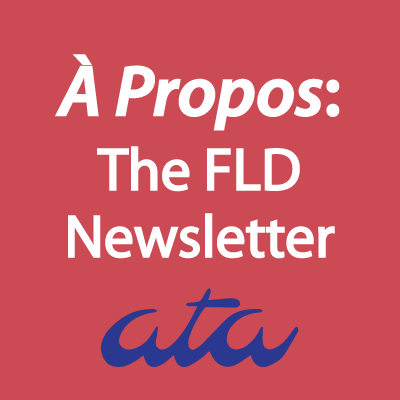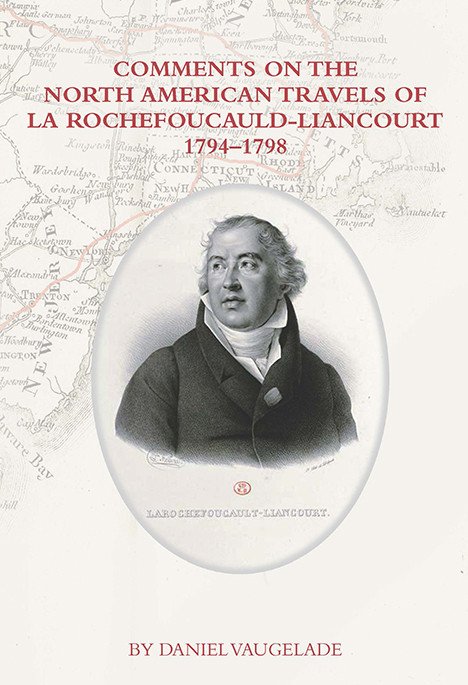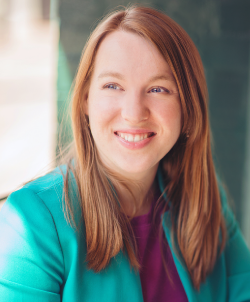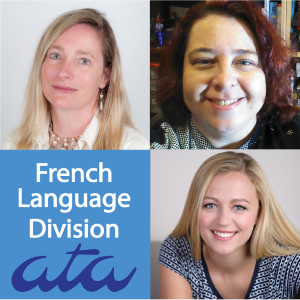 “You either have it or you don’t.” That’s what a lot of language professionals think about our profession. It’s what I thought when I was a university student studying abroad in France and I would listen to other American students speaking French, trying to determine if I was as good as they were. Ten years later, I decided for myself that I had a gift for languages—without anyone ever telling me so—and I decided to give freelance translation a try while living in Quebec City, Canada. It was only recently when I obtained the title of Certified Translator from the Corporation of Translators, Terminologists and Interpreters of New Brunswick (CTINB), however, that I felt that my opinion of myself was justified. While the road to certification was a bumpy one for me, it has turned out to be a positive and fulfilling experience that I would recommend to all translators, regardless of where you live.
“You either have it or you don’t.” That’s what a lot of language professionals think about our profession. It’s what I thought when I was a university student studying abroad in France and I would listen to other American students speaking French, trying to determine if I was as good as they were. Ten years later, I decided for myself that I had a gift for languages—without anyone ever telling me so—and I decided to give freelance translation a try while living in Quebec City, Canada. It was only recently when I obtained the title of Certified Translator from the Corporation of Translators, Terminologists and Interpreters of New Brunswick (CTINB), however, that I felt that my opinion of myself was justified. While the road to certification was a bumpy one for me, it has turned out to be a positive and fulfilling experience that I would recommend to all translators, regardless of where you live.
First, let me give you some background information. Not having studied translation formally in school, when I first started out I didn’t realize that Canada had its own roster of translators associations, or that certification was even an option. After speaking with an acquaintance in the US who had told me that I needed to be certified in order to work for the company where he worked, I joined ATA and decided to start by completing a mentorship with an experienced translator. At the beginning of our mentorship, my mentor told me how she had failed the ATA certification exam twice before passing on her third try. Since I looked up to her and valued her advice, I figured that getting certified was essential in order to make it as a translator, and I decided to go for it on my next trip to the States. Unfortunately, after eventually failing twice myself, I decided that I would wait until trying again, thinking that I needed more experience and practice.
At the same time, since I didn’t know how long my husband and I would be living in Canada, I debated whether an American or Canadian certification would bring me the most benefit. I eventually heard about Quebec’s professional association, the Ordre des traducteurs terminologues et interprètes agréés du Québec (OTTIAQ), and started looking into their certification process. I learned that, in Canada, the titled of Certified Translator is granted by each province’s regulatory body, the Canadian Translators, Terminologists and Interpreters Council (CTTIC), and that each province’s translators association has its own certification process. I was happy to find out that OTTIAQ offers a few different paths to certification, all of which take into account one’s educational background and professional experience and don’t necessarily involve an exam (more on that later). Given my specific experience, the only other criteria I had to fulfill before submitting my application for review was obtaining at least 5 years of experience.
Just before reaching the 5-year mark, my husband accepted a job offer in Saint John, New Brunswick, and more options became apparent to me after looking into New Brunswick’s certification process. Now, I not only had the option of taking an exam or having my qualifications reviewed, but I could also get certified by way of a mentorship. Given my experience with the ATA exam and the uncertainty of meeting the requirements for a “certification on dossier,” I opted for the mentorship in the hopes that my work would speak for itself, in the end.
I should note that, while ATA certification boosts your credibility in the United States, it is not required by all government agencies and, in some cases, a foreign certification will do. In Canada, however, certification is often required by the Translation Bureau in order to translate official documents for the government. And in New Brunswick—the only officially bilingual province in Canada—certification is mandatory. All the more reason for me to be certified.
Over the next 6 months, I submitted more than the minimum of 30,000 words to my mentor for her review and feedback. While my first few translations came back with a slew of comments (turns out I did need more practice), little by little I started seeing fewer and fewer revisions and, by the end of the mentorship, more than one document came back to me with no revisions at all. Although my mentor told me from the beginning that her aim was for me to go from a “very good translator to an excellent one,” I didn’t start to feel worthy of receiving the title of Certified Translator until she told me a few months into the mentorship that she was definitely going to recommend me for certification.
The big news came a few weeks after the end of the mentorship when I received word from the president of the CTINB that my mentor’s recommendation had been approved by the board and I was officially a certified French-to-English translator. Hooray! It was about time.
Looking forward, I hope to take advantage of the reciprocity agreement between the CTINB and Quebec’s association to have my certification recognized by OTTIAQ, as well as benefit from the liability insurance that the Order offers. As with ATA, there are many benefits to being a member of other translators associations; you just have to pick and choose which ones are most beneficial to you.
And who knows: maybe ATA’s new computerized exam will prove to be another way for me and many other translators to demonstrate our skills, in the conditions in which we feel most comfortable. It’s what I’m hoping for, at least!
Natalie Pavey is a French to English translator who specializes in French to English translation services in the fields of sustainable development, business communications and marketing.
 elcome to episode 8 of the French Language Division’s Continuing Education Series podcast. The main focus of this podcast is the craft of translation (English > French and French > English). In this episode, Carolyn Yohn joins Angela Benoit to talk about a book she translated: Comments on the North American Travels of La Rochefoucauld-Liancourt: 1794 – 1798. See a copy of the book cover at left. Find out who Liancourt was and learn about his role in documenting early American history. Listen to Carolyn talk about fascinating translation challenges and how she journeyed through a work of historical, political and economic significance.
elcome to episode 8 of the French Language Division’s Continuing Education Series podcast. The main focus of this podcast is the craft of translation (English > French and French > English). In this episode, Carolyn Yohn joins Angela Benoit to talk about a book she translated: Comments on the North American Travels of La Rochefoucauld-Liancourt: 1794 – 1798. See a copy of the book cover at left. Find out who Liancourt was and learn about his role in documenting early American history. Listen to Carolyn talk about fascinating translation challenges and how she journeyed through a work of historical, political and economic significance.
 Carolyn Yohn translates French and Hungarian legal and academic texts into American English under the name Untangled Translations. In 2015, the Consulate General of France in San Francisco added her to their list of translators officially approved to translate credentials and personal documents. She is a regional ambassador for the Northern California Translators Association and was a featured speaker for the American Translators Association. Her first book-length translation — Comments on the North American Travels of La Rochefoucauld-Liancourt, 1794–1798 — is forthcoming from Commonwealth Books of Virgina. When she’s not clacking away at the keyboard, you can find Carolyn hiking, swimming, and painting (watercolors). Find her on Twitter, LinkedIn, and Facebook to learn more!
Carolyn Yohn translates French and Hungarian legal and academic texts into American English under the name Untangled Translations. In 2015, the Consulate General of France in San Francisco added her to their list of translators officially approved to translate credentials and personal documents. She is a regional ambassador for the Northern California Translators Association and was a featured speaker for the American Translators Association. Her first book-length translation — Comments on the North American Travels of La Rochefoucauld-Liancourt, 1794–1798 — is forthcoming from Commonwealth Books of Virgina. When she’s not clacking away at the keyboard, you can find Carolyn hiking, swimming, and painting (watercolors). Find her on Twitter, LinkedIn, and Facebook to learn more!
